Trauma Bonding In Friendships

Table of Contents
Trauma Bonding in Friendships: Recognizing the Signs and Finding Your Way Out
Trauma bonding, often discussed in the context of abusive romantic relationships, can also subtly creep into friendships. It's a complex psychological phenomenon where intense emotional connections form amidst cycles of conflict, drama, and instability. This isn't about healthy conflict resolution; it's about a pattern of emotional manipulation and instability that leaves you feeling trapped and dependent, despite the negativity. This article will explore the signs of trauma bonding in friendships, its underlying mechanisms, and how to break free from these unhealthy dynamics.
Understanding Trauma Bonding: Beyond the Romantic Narrative
While often associated with abusive romantic relationships, trauma bonding can occur in any close relationship, including friendships. The core principle remains the same: a bond built not on mutual respect and support, but on a cycle of tension, relief, and intermittent reinforcement. Think of it like this: periods of intense closeness and affection are followed by conflict, criticism, or even emotional neglect. This creates a powerful emotional rollercoaster that makes it difficult to leave, even when the relationship is clearly detrimental.
Key Characteristics of Trauma Bonding in Friendships:
- Intermittent Reinforcement: This is a key element. Think of it as a slot machine – you never know when you'll get a reward (positive interaction, validation, affection), but the possibility keeps you hooked. This unpredictability fuels the addiction-like cycle.
- Emotional Rollercoaster: One minute you're best friends, the next you're fighting or being ignored. This constant fluctuation makes it hard to establish emotional stability.
- Fear of Abandonment: The fear of losing the friendship, even a toxic one, can be overwhelming. This fear is often manipulated by the other person to control the dynamic.
- Self-Blame and Justification: You might find yourself constantly apologizing, making excuses for your friend's behavior, and minimizing the negative aspects of the friendship. This is a classic sign of trauma bonding.
- Guilt and Shame: The friend might use guilt and shame to manipulate you, making you feel responsible for their actions or the problems in the friendship.
- Low Self-Esteem: Trauma bonding often thrives in friendships where one individual has low self-esteem, making them more vulnerable to manipulation and less likely to assert their needs.
- Lack of Boundaries: Healthy friendships have clear boundaries. In trauma-bonded friendships, boundaries are consistently blurred or ignored, leading to feelings of being overwhelmed and used.
How to Identify if You're in a Trauma-Bonded Friendship:
Ask yourself these crucial questions:
- Do you feel constantly anxious or on edge around this friend?
- Do you regularly feel drained or emotionally exhausted after spending time with them?
- Do you frequently apologize for things that aren't your fault?
- Do you find yourself constantly justifying their behavior to others?
- Do you feel like you walk on eggshells around this friend?
- Does the friendship feel more like a burden than a source of support?
Breaking Free from the Cycle: Steps Towards Healing
Leaving a trauma-bonded friendship is challenging, but essential for your well-being. Here's how to begin the process:
- Acknowledge the Problem: The first step is recognizing that the friendship is unhealthy and that you deserve better.
- Set Boundaries: Start setting firm boundaries, even small ones. This might involve limiting contact, saying no to requests, or refusing to engage in arguments.
- Seek Support: Talk to a trusted friend, family member, therapist, or counselor. Having a support system is crucial during this process.
- Practice Self-Compassion: Be kind to yourself. Leaving a trauma bond is difficult, and you deserve credit for taking this important step.
- Focus on Self-Care: Prioritize activities that nourish your mind, body, and spirit. This might include exercise, meditation, spending time in nature, or pursuing hobbies.
- Therapy: Consider professional help. A therapist can provide tools and strategies for coping with the emotional aftermath of a trauma-bonded relationship.
Moving Forward: Cultivating Healthy Friendships
Once you've freed yourself from the trauma bond, focus on building healthy friendships based on mutual respect, trust, and support. Look for friendships where:
- Boundaries are respected.
- Communication is open and honest.
- Support is reciprocal.
- You feel valued and appreciated.
Trauma bonding in friendships is a serious issue that can significantly impact mental well-being. Recognizing the signs, understanding the underlying dynamics, and taking steps to break free are crucial for reclaiming your emotional health and building fulfilling relationships. Remember, you deserve healthy, supportive connections. Don't hesitate to seek professional help if you're struggling.

Thank you for visiting our website wich cover about Trauma Bonding In Friendships. We hope the information provided has been useful to you. Feel free to contact us if you have any questions or need further assistance. See you next time and dont miss to bookmark.
Featured Posts
-
Can Chickens Bond With Humans
Nov 28, 2024
-
Bonding Requirements For Csst
Nov 28, 2024
-
Elmers Craft Bond Glue Stick
Nov 28, 2024
-
Robbies Shame Nicole Appleton Affair
Nov 28, 2024
-
Liverpool 2 0 Real Madrid Loss
Nov 28, 2024